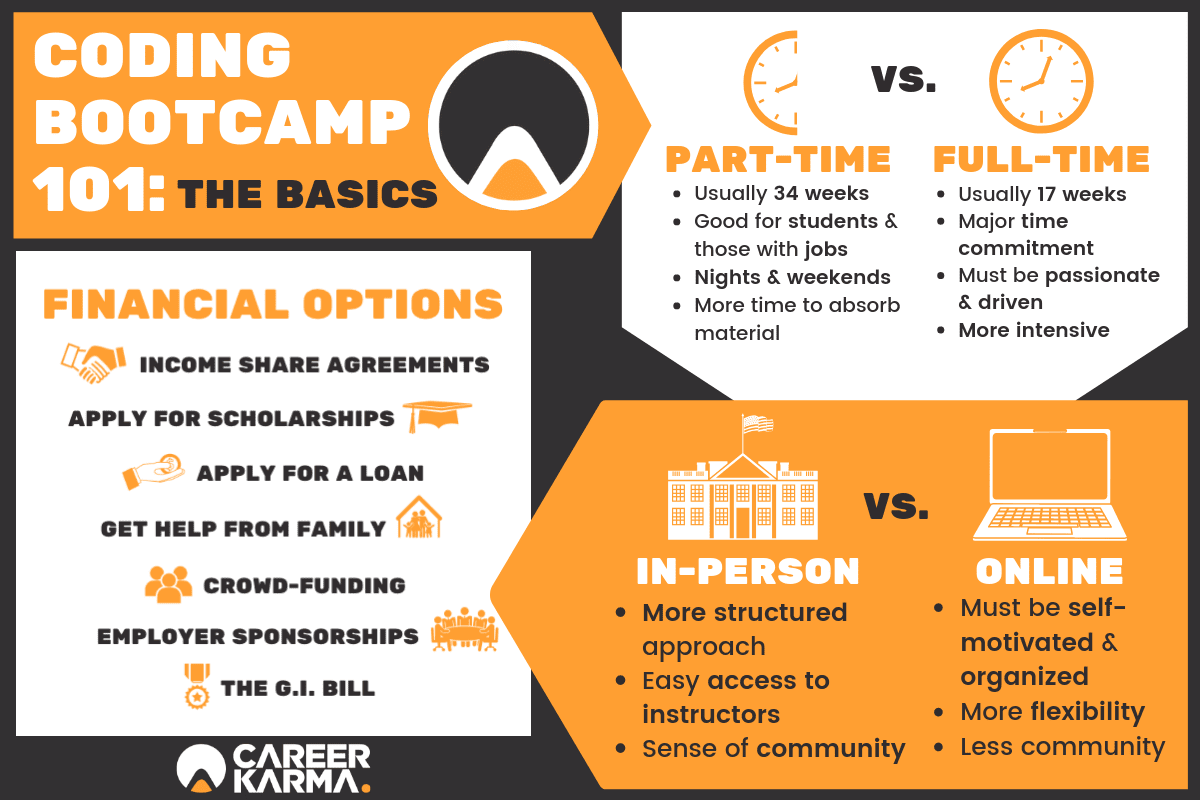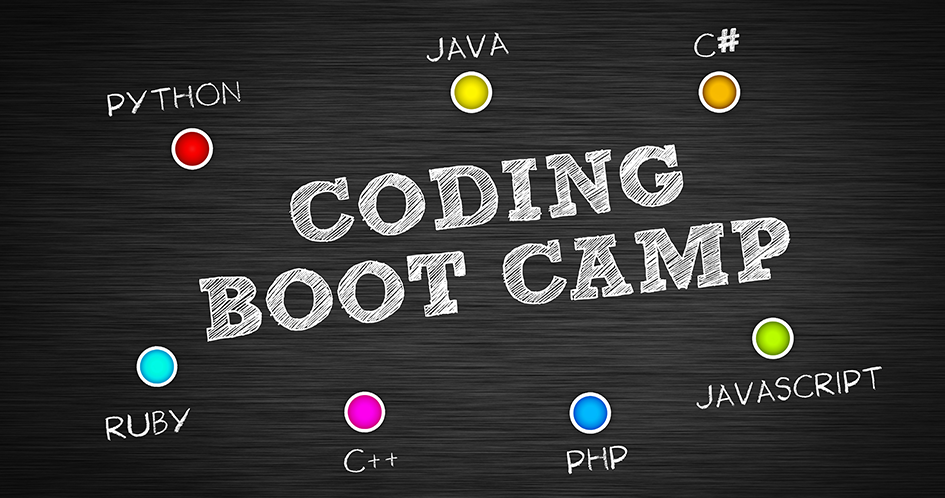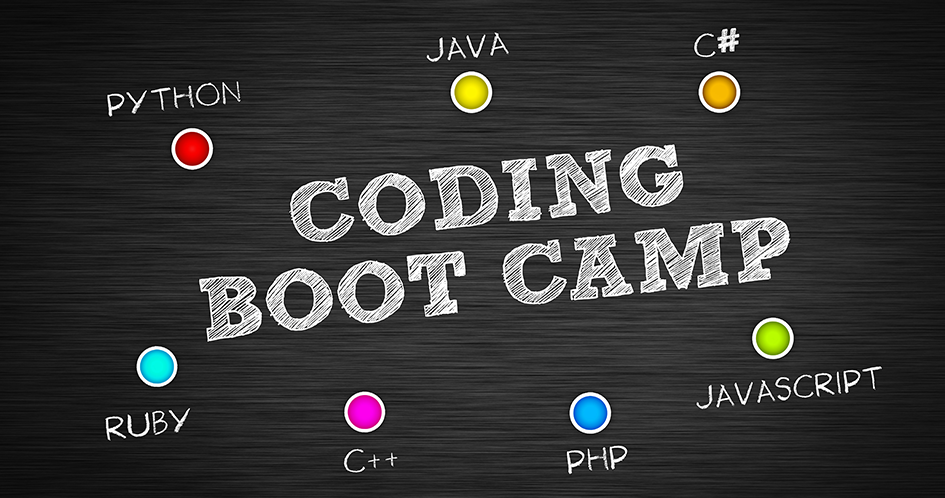Curriculum Overview

Coding bootcamps offer intensive training in software development, typically lasting anywhere from a few weeks to several months. The curriculum is designed to provide students with the practical skills needed to enter the tech industry quickly. A common thread across most bootcamps is a focus on hands-on projects and real-world application, rather than extensive theoretical study.
What do you learn in coding bootcamp – Bootcamp curricula generally cover a range of topics, focusing on both the theoretical underpinnings of programming and the practical application of those concepts through projects and exercises. The specific subjects covered will vary depending on the bootcamp’s specialization (front-end, back-end, or full-stack development), but there are common elements across most programs.
Typical Bootcamp Subjects
Most coding bootcamps incorporate a combination of programming languages, frameworks, databases, and tools. Students learn to build and deploy applications, often culminating in a capstone project showcasing their acquired skills. The depth of coverage in each area will vary based on the bootcamp’s length and focus.
Commonly taught programming languages include JavaScript, Python, Java, Ruby, and C#. Popular frameworks and libraries include React, Angular, Node.js, Spring, and Ruby on Rails. Essential tools encompass version control systems (like Git), databases (like SQL and NoSQL), and cloud platforms (like AWS or Google Cloud). Beyond the technical skills, bootcamps often include instruction in soft skills such as teamwork, communication, and professional development.
Curriculum Comparison Across Bootcamps
The following table compares the curricula of three hypothetical bootcamps to illustrate the variety in offerings. Note that these are examples, and actual bootcamp curricula will vary.
| Bootcamp Name | Programming Languages | Frameworks/Tools | Focus Area |
|---|---|---|---|
| CodeCraft Academy | JavaScript, Python, SQL | React, Node.js, Git, PostgreSQL | Full-Stack Development |
| FrontEnd Focus | JavaScript, HTML, CSS | React, Angular, Redux, Git | Front-End Development |
| BackEnd Boost | Python, Java, SQL | Spring Boot, Django, Docker, AWS | Back-End Development |
Front-End, Back-End, and Full-Stack Development Bootcamps
The differences between these three types of bootcamps lie in their specialization and the skills they impart. Each caters to a different role within software development.
Front-end development bootcamps focus on the client-side of web applications – what the user sees and interacts with. Curricula emphasize HTML, CSS, and JavaScript, along with frameworks like React, Angular, or Vue.js. Graduates are prepared for roles such as front-end developer or UI developer.
Back-end development bootcamps concentrate on the server-side of applications – the logic, databases, and APIs that power the user interface. These bootcamps typically cover languages like Python, Java, or Ruby, along with frameworks like Node.js, Django, or Spring. Graduates are prepared for roles such as back-end developer or API developer.
Full-stack development bootcamps provide a broader education, covering both front-end and back-end technologies. Graduates gain a comprehensive understanding of the entire application lifecycle, making them versatile and adaptable to various roles within a development team.
Project-Based Learning
Coding bootcamps prioritize hands-on experience, making project-based learning a cornerstone of their curriculum. Students don’t just passively absorb information; they actively apply their skills to build real-world applications, strengthening their understanding and building a portfolio to showcase their abilities to potential employers. This approach fosters critical thinking, problem-solving, and collaborative skills, essential for success in the tech industry.
Students work on a variety of projects throughout the bootcamp, progressing in complexity and scope as their skills develop. Early projects might focus on foundational concepts, while later projects tackle more ambitious challenges, culminating in a substantial capstone project. This iterative approach allows for continuous learning and refinement of techniques.
Types of Projects Undertaken
Throughout a typical coding bootcamp, students engage in a range of projects designed to build specific skill sets. These projects often involve creating functional websites, developing mobile applications, building back-end systems, or working with data analysis tools. Early projects might focus on creating simple web pages using HTML, CSS, and JavaScript, while later projects could involve building full-stack applications incorporating databases and APIs. The progression is designed to mirror the demands of real-world development roles. For example, early projects might involve creating a simple to-do list app, while later projects might involve building a more complex e-commerce platform.
Capstone Project Examples
Capstone projects represent the culmination of a student’s learning journey. These are substantial undertakings that require students to integrate the skills and knowledge acquired throughout the bootcamp. The complexity and scope vary depending on the bootcamp and the student’s chosen specialization. Examples include developing a full-stack application for managing inventory for a small business, building a social media platform with user authentication and data persistence, or creating a data visualization dashboard using a large public dataset. A successful capstone project demonstrates a student’s ability to work independently, manage time effectively, and solve complex problems. The project often involves working with multiple technologies and often requires collaboration with other students, mirroring the collaborative nature of software development teams in professional settings.
Hypothetical Bootcamp Project: A Smart Home Device Control System
This project would involve building a web application to control a simulated smart home environment. The application would allow users to remotely monitor and control various aspects of their home, such as lighting, temperature, and security systems.
The technologies used would include:
* Front-end: React.js for building a user-friendly interface, HTML, CSS for styling and layout.
* Back-end: Node.js with Express.js for creating a RESTful API, a database (e.g., PostgreSQL or MongoDB) for storing device data and user information.
* Data Management: A suitable database to handle user accounts and device status.
* Communication Protocol: A simulated API to interact with smart home devices (this could be replaced with a real API if access is available).
The project would solve the problem of providing a convenient and user-friendly way to manage a smart home environment, allowing users to control various aspects of their home from a central location. Students would learn to integrate various technologies, manage data efficiently, and build a robust and scalable application. The complexity would involve handling asynchronous operations, managing user authentication and authorization, and ensuring data security. This project would directly reflect the skills sought by employers in the field of Internet of Things (IoT) development.
Technical Skills Acquired

Coding bootcamps provide intensive training, equipping graduates with a robust set of technical skills highly sought after by entry-level developers. These skills are not merely theoretical; they are honed through hands-on projects and real-world simulations, preparing students for immediate contributions to development teams. The curriculum focuses on practical application, ensuring graduates possess the competency to tackle challenges encountered in professional settings.
Programming Languages
Bootcamps typically focus on several in-demand programming languages. The specific languages vary depending on the bootcamp’s specialization (e.g., web development, data science), but common choices include JavaScript, Python, Java, and C#. Students gain proficiency in writing, debugging, and testing code using these languages, learning to apply best practices for clean, efficient, and maintainable code. For example, a web development bootcamp might heavily emphasize JavaScript for front-end development and potentially Python or Node.js for back-end development. A data science bootcamp, conversely, would prioritize Python for data analysis and machine learning tasks. This practical experience translates directly to entry-level roles where developers are immediately tasked with writing functional code.
Databases
Understanding databases is crucial for any developer. Bootcamps cover relational databases (like MySQL, PostgreSQL) and NoSQL databases (like MongoDB). Students learn how to design databases, write SQL queries to retrieve and manipulate data, and implement data models appropriate for different applications. For instance, a student might build a database to store user information for a web application, learning to design tables, define relationships, and ensure data integrity. This skill is immediately transferable to roles requiring data management and interaction with databases.
Version Control (Git)
Version control, primarily using Git, is an essential skill for collaborative software development. Bootcamps provide comprehensive training in using Git for managing code changes, collaborating with other developers, and resolving merge conflicts. Students learn to use platforms like GitHub or GitLab to host their code repositories, track changes, and manage different versions of their projects. This is critical for any entry-level developer position, as nearly all professional development teams rely on Git for collaborative coding and project management. A practical example would be using Git to track changes made during the development of a team project, ensuring seamless collaboration and the ability to revert to previous versions if necessary.
Web Development Frameworks
Many bootcamps offer specialized training in web development frameworks, such as React, Angular, or Vue.js for front-end development, and Node.js, Django, or Ruby on Rails for back-end development. Students learn how to build dynamic and interactive web applications using these frameworks, understanding their architectures and best practices. This directly translates to roles requiring the creation of responsive and efficient web applications, a common requirement for many entry-level web developer positions. For example, a graduate might build a full-stack application using React for the front-end and Node.js for the back-end, demonstrating proficiency in both client-side and server-side development.
Testing and Debugging
Effective testing and debugging are paramount to software development. Bootcamps emphasize writing unit tests, integration tests, and conducting thorough debugging to identify and fix errors. Students learn to use debugging tools and apply best practices to ensure code quality and reliability. This skill is crucial for any developer role, as it directly impacts the stability and maintainability of the software they produce. A practical example is using automated testing frameworks to identify bugs in a web application before deployment, preventing potential issues and improving user experience.
Soft Skills Development: What Do You Learn In Coding Bootcamp

Coding bootcamps don’t just teach you to write code; they also cultivate essential soft skills crucial for success in the tech industry. These skills, often overlooked, are equally important as technical proficiency in securing a job and thriving in a collaborative work environment. The fast-paced, project-driven nature of bootcamps provides a unique environment for honing these abilities.
The intensive collaborative environment of a coding bootcamp naturally fosters the development of vital soft skills. Students work together on projects, requiring constant communication, negotiation, and compromise. This hands-on experience translates directly into the collaborative dynamics of a professional software development team. Problem-solving, often tackled in group settings, becomes a shared responsibility, encouraging diverse perspectives and approaches. This shared learning process strengthens teamwork and communication skills significantly more than traditional educational settings.
Teamwork and Collaboration
Bootcamps often structure projects around teamwork. Students learn to divide tasks efficiently, manage timelines, and provide constructive feedback to their peers. This experience simulates real-world team dynamics, preparing graduates for the collaborative nature of software development. For example, a typical group project might involve one student specializing in front-end development, another focusing on back-end, and a third handling database management. The success of the project depends entirely on their ability to work together seamlessly, effectively communicating their progress and resolving conflicts constructively.
Communication Skills
Effective communication is paramount in the tech industry. Bootcamps emphasize clear and concise communication, both written and verbal. Students regularly present their work, explain technical concepts to both technical and non-technical audiences, and participate in code reviews. This constant practice enhances their ability to articulate ideas clearly, actively listen to feedback, and adapt their communication style to different audiences. This is vital, as developers frequently need to explain complex technical solutions to clients or colleagues who may not have a strong technical background.
Problem-Solving and Critical Thinking
Coding inherently involves problem-solving. Bootcamps encourage a systematic approach to debugging and troubleshooting, teaching students to break down complex problems into smaller, manageable parts. They learn to identify the root cause of errors, evaluate different solutions, and choose the most efficient and effective approach. This analytical thinking extends beyond coding; it’s a transferable skill applicable to various challenges in a professional setting. For instance, identifying and fixing a bug in a program requires the same analytical and problem-solving skills needed to resolve a conflict within a team or overcome a project roadblock.
The Importance of Soft Skills in Job Search
While technical skills are essential for landing a coding job, soft skills are equally crucial. Employers increasingly value candidates who can work effectively in teams, communicate clearly, and solve problems creatively. A candidate with strong technical skills but poor communication skills might struggle to collaborate effectively, leading to decreased productivity and frustration within a team. Conversely, a candidate with excellent communication and teamwork skills can compensate for minor technical gaps, demonstrating a willingness to learn and collaborate effectively. Therefore, the holistic development provided by bootcamps, encompassing both technical and soft skills, makes graduates highly competitive in the job market.
Career Services and Job Placement
Coding bootcamps understand that successful completion is only half the battle. Securing a well-paying job in the tech industry is the ultimate goal for most students, and reputable bootcamps actively support this transition through comprehensive career services. These services are designed to equip graduates with the skills and resources needed to navigate the job search process effectively and land their dream roles.
The success of a coding bootcamp is often measured by its job placement rate, reflecting the effectiveness of its career services. These services are a critical component of the overall learning experience, supplementing the technical skills acquired during the curriculum.
Career Services Offered by Coding Bootcamps
Most coding bootcamps offer a range of career services designed to help graduates find employment. These services typically include resume and portfolio reviews, mock interviews, career counseling, and job search workshops. Many also provide access to a network of hiring partners and alumni, facilitating connections with potential employers. Some bootcamps even offer assistance with salary negotiation and benefits packages. The specific services offered can vary between bootcamps, so it’s essential to research individual programs thoroughly. For instance, some bootcamps might offer personalized mentorship programs connecting students with industry professionals, while others may focus on group workshops and networking events.
The Role of Networking and Mentorship in Career Placement
Networking and mentorship play a crucial role in a graduate’s job search. Bootcamps facilitate networking opportunities through alumni networks, industry events, and connections with hiring partners. These networks provide access to potential employers and valuable insights into the industry. Mentorship programs, often pairing graduates with experienced professionals in their field, offer personalized guidance, advice, and support throughout the job search process. Mentors can provide feedback on resumes and cover letters, practice interview techniques, and offer valuable career advice based on their own experiences. This personalized support significantly increases the chances of securing a desirable position. For example, a mentor might help a graduate identify specific companies aligned with their career goals or advise on navigating the complexities of the interview process for a specific tech role.
Comparison of Job Placement Rates, What do you learn in coding bootcamp
Job placement rates vary significantly between coding bootcamps. Several factors influence these rates, including the bootcamp’s curriculum, the quality of its career services, the strength of its alumni network, and the overall job market. Direct comparison requires caution as data reporting methodologies can differ. However, a general comparison might look like this:
- High Placement Rate Bootcamps (often above 80%): These bootcamps often boast strong industry partnerships, extensive career services, and a proven track record of successful placements. They may focus on in-demand specializations and maintain close relationships with hiring managers.
- Moderate Placement Rate Bootcamps (around 60-79%): These bootcamps may offer solid career services but might lack the extensive network or specialized focus of the higher-placement bootcamps. Their success may depend heavily on individual student effort and the current job market conditions.
- Lower Placement Rate Bootcamps (below 60%): These bootcamps may have less robust career services or a smaller alumni network. Their graduates may require more self-directed effort to find employment.
It is important to note that these are generalized categories and individual bootcamp placement rates can fluctuate based on various factors. Always refer to the most recent, independently verified data published by the bootcamp itself or reputable third-party sources before making any decisions.


Tim Redaksi